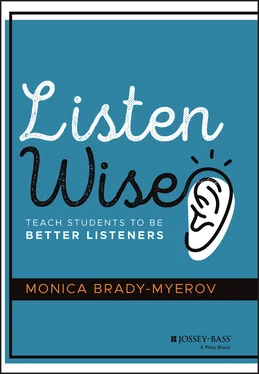Jossey-Bass books and products are available through most bookstores. To contact Jossey-Bass directly, call our Customer Care Department within the U.S. at 800-956-7739, outside the U.S. at +1 317 572 3986, or fax +1 317 572 4002.
Wiley also publishes its books in a variety of electronic formats and by print-on-demand. Some material included with standard print versions of this book may not be included in e-books or in print-on-demand. If this book refers to media such as a CD or DVD that is not included in the version you purchased, you may download this material at http://booksupport.wiley.com. For more information about Wiley products, visit www.wiley.com.
Library of Congress Cataloging-in-Publication Data is Available:
ISBN 9781119755494 (hardback)
ISBN 9781119755531 (ePDF)
ISBN 9781119755524 (ePUB)
Cover design: Wiley
Cover image: © Brandon Laufenberg/Getty Images
FIRST EDITION
I would never have started Listenwise and thus had the experience to write this book if my husband Adam Brady-Myerov hadn't listened to me when I said I had an idea. He didn't poke holes in it or ask whether I was qualified to be an edtech entrepreneur, he just listened and said “Go for it.” I want to thank him for always listening. And to my children, who have taught me so much, thank you for your love, support, and patience.
I want to thank many people for helping me with this book. Thank you to my sister Liz Witherspoon for editing as I wrote and being so supportive. Thanks to Aja Frost, a former intern and friend, for helping me first get the ideas on paper. I want to thank Alistair Van Moere, the Director of Product for MetaMetrics, for co-writing the chapter on assessing listening. Also thanks to Heather Koons of MetaMetrics for her contributions to the listening and reading chapter. Christin Wheeler, a reading specialist, shared valuable insights with me. Rachel Kramer Theodorou, a professor at Brandeis University, contributed her expertise with English learners. My team at Listenwise has been a huge help and inspiration. I could never have done this without Karen Gage, my business partner and friend. Dr. Marielle Palombo, Director of Curriculum, provided valuable insights and many, many edits to the book. Without team members Adam Buchbinder, Chelsea Murphy, Erica Petersen, Matt Pini, and Vicki Krupp I never would have learned so much about listening as we grew the company together. Thank you to the many teachers who have provided their insights and stories for this book, especially Jim Bentley and Scott Petri.
Thank you to my mother for telling me I could do anything I wanted and pushing me to do it. And to my father for asking me to read him the New York Times while he drove. Reading out loud to my father launched me on this path and I dedicate this book to his memory.
My students don't listen!
That's what almost every teacher says when I tell them that, after a career as an NPR reporter, I have started an education company focused on listening. They tell me they must repeat themselves when explaining how the Civil War got started. Or demonstrate a math concept over and over. They give simple homework directions in multiple ways. They call out to students many times before they have their attention. They lament that their students are poor listeners.
Might every student struggle with this most basic skill? Listening. If you were to stop a hundred teachers at an education conference and ask them this question, as I have, you will find that yes, listening is something that teachers report most students don't know how to do well. And teachers are at a loss for what to do about it. This book will help.
Listening is a skill that can be modeled, taught, and improved. I have learned this on my journey from an award-winning public radio reporter to the founder of an education technology start-up called Listenwise, a website for K–12 teachers that uses the power of audio stories to advance listening and literacy skills in all students.
HOW THIS BOOK IS ORGANIZED
I organized this book to build the case for teaching listening, but also as a practical guide for K–12 teachers interested in using audio in their teaching, with class activities sprinkled throughout the book. The strategies and activities include suggestions for elementary students and middle/high school students. Readers should start from the beginning and work through to the end for the most comprehensive understanding of how and why to teach listening comprehension. However, you can also jump to the chapter on English learners or listening and reading, if that's where your interest lies. I structured the book to start with and build on academic research and my personal experience in the field as a reporter, because I've learned many people need to be convinced that listening can and should be taught because it will help their students' overall academic performance. That's why I've now devoted my career to it as the founder of Listenwise.com.
Throughout the book, I mention specific audio stories and podcasts that demonstrate a concept or could be used in a class activity. The original source of the audio is referenced in the endnotes, but you can also hear the audio and use fully developed lessons by going to https://listenwise.com/book, where you will have free access to Listenwise Premium for a period of time. Listenwise.comshould be considered a digital companion to this book, so I encourage you to engage your ears as well as your eyes as you read.
In the opening chapter, “My Love of Audio Storytelling,” I share my experiences as a journalist and how it shaped my love of audio. It explains how my passion turned into a desire to help students learn through listening and become better listeners.
In Chapter 2, “Listening Is a Skill,” I show you that listening is a skill that can be taught, practiced, improved, and successfully demonstrated on standardized tests. It's a skill that needs to be taught because it's critical to success in college, career, and life. Curriculum standards in all 50 states include listening as a component for K–12 students. Listening skills rose to prominence with the adoption of the Common Core by many states in 2009. The standards across the states require teachers to include purposeful listening in their instruction. And, of course, listening is required in teaching students to speak English.
Chapter 3, “This Is Your Brain on Listening,” looks at how listening is a complex neurological construct that involves multiple areas of the brain. Listening requires more from your brain than many other skills. You will learn from the latest neuroscientists, cognitive scientists, and communications and psychology experts. Hearing isn't all that is involved in listening, but it is a critical part. One neuroscientist explains that “sounds are among the most common and powerful stimuli for emotions.” 1 Listening triggers a variety of parts of the brain to create a “movie in your mind.”
You can dig into Chapter 4, “How to Teach Listening,” to learn actionable techniques for teaching your students. I will share some proven strategies to improve listening. Whether you are a third-grade teacher using listening strategies to improve reading, or an 11th-grade teacher aiming to improve your students' listening skills for the workforce, this chapter gives you practical ways to start incorporating more listening into your teaching. It shows you how including listening in your instruction can teach academic vocabulary and curriculum content and help students practice reading.
You might not be a reading teacher, so you might not have considered how listening can help your students read. But Chapter 5may change your thinking. In “The Intersection Between Listening and Reading,” you learn why I believe listening is the missing piece of the literacy puzzle. Despite dozens of new approaches, techniques, and programs, the average national fourth- and eighth-grade reading scores are stagnant. There is an interdependency between listening comprehension and reading comprehension. In general, the poor reader is also likely to be a poor listener. Listening is a foundational part of teaching students how to read, yet by the middle grades it virtually disappears from our classrooms. In this chapter, you learn how using listening regularly in your classroom at any grade level can help improve reading.
Читать дальше












